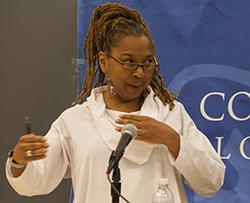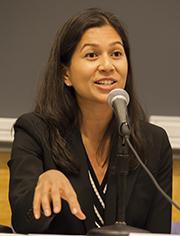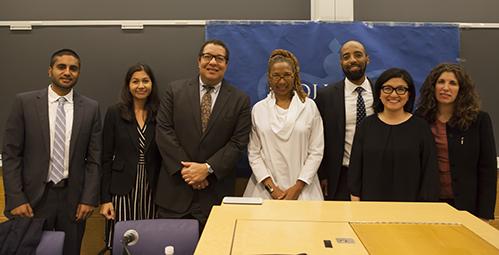A Long Road Ahead on Civil Rights Advocacy
Future Advances Under the Civil Rights Act of 1964 are Imperiled, Say Advocates During a Panel Discussion of the Law's Contemporary Legacy.
New York, November 18, 2014—During the early voting season in Texas this year, civil rights litigator Myrna Peréz ’03 spent 12-hour days trying to convince people to tell their stories of voting hardships to the media.
Peréz believes that she must help the public understand how voter ID laws are crushing the right to vote. The Texas law, for example, demands specific documentation that can be hard to get. African-American voter Sammie Bates, 74, learned that she would need to order her birth certificate from Mississippi and pay $42 for it. Bates, said Peréz, was “literally choosing between feeding her family and getting the birth certificate that she needed to vote.”
| Professor Kimberlé Williams Crenshaw |
Perez, deputy director of the Democracy Program at the Brennan Center for Justice, spoke with other scholars and practitioners as part of an Oct. 30 panel discussion on the contemporary legacy of the Civil Rights Act of 1964. The event was the latest in Columbia Law School’s 64@50 series, a yearlong undertaking in which faculty members and students examine how far the nation has progressed on issues of civil rights, while also assessing strategies for addressing the concerns that remain.
“We have a challenge in how we talk about this commemoration,” said Columbia Law School Professor Kimberlé Williams Crenshaw, co-founder of the African-American Policy Forum, who moderated the discussion. “How do we celebrate the accomplishments while at the same time maintaining the urgency of the now?”
Passage of the Civil Rights Act fostered remarkable changes, including the end of Jim Crow laws and segregated public accommodations, as well as efforts to remove earlier voting restrictions and limitations on educational opportunities.
But the act failed to address the full effects of structural and historic bias, panelists said. Vincent Southerland, senior counsel of the NAACP Legal Defense and Education Fund (LDF), said civil rights litigants are on the defensive now. The message of the Supreme Court, he said, is “we’re done with it, and we’re ready to wipe our hands of the efforts to remedy the prior four centuries of oppression.”
| (l-r) Kumar Rao, director of strategic initiatives at the Bronx Defenders; Dennis Parker, director of the ACLU Racial Justice Program; Vincent Southerland, senior counsel at the NAACP Legal Defense and Education Fund (LDF); Jin Hee Lee '00, senior counsel at the LDF; and Myrna Perez '03, deputy director of the Democracy Program at the Brennan Center for Justice. |
Recent setbacks in two U.S. Supreme Court cases–on voting rights in Shelby County v. Holder (2013) and diversity admissions in higher education in Schuette v. Coalition to Defend Affirmative Action (2014) – are straining civil rights strategies.
“The danger is that we are in very real jeopardy of losing, and, in fact, have already lost, some of the advances we made,” said Dennis Parker, director of the ACLU Racial Justice Program.
Especially worrying is a fair housing case coming before the Supreme Court that will test the use of disparate impact to measure discrimination.
“The challenge of proving intentional discrimination and discriminatory purpose to a court, especially to a current court, is so high that it makes the idea of vindicating people’s rights in court almost impossible,” said Jin Hee Lee ’00, senior counsel at LDF.
| Professsor Elora Mukherjee |
Immigrants are also without remedies.
“The drafters of the civil rights movement didn’t anticipate the wave of immigration that would be entering the United States and the protections that they deserve under the law,” said Professor Elora Mukherjee, director of the Law School’s new Immigrants’ Rights Clinic.
The true lessons of the Civil Rights Act for contemporary lawyers and law students may lie in the citizen engagement that pushed it to the fore, said Kumar Rao, director of strategic initiatives at the Bronx Defenders.
“I like to think that we are part of the legacy of American activists who move to make the country better,” said Rao. “It’s going to be tough, but it’s been tough in the past.”
The event was sponsored by the Columbia Journal of Race and Law.
| Panelists for the 64@50 Event pose together. |



